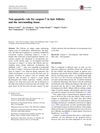16 citations,
January 2022 in “International journal of molecular sciences” Certain daily habits like stress, diet, and sleep can affect the severity of hair loss in alopecia areata.
 16 citations,
December 2021 in “Frontiers in Endocrinology”
16 citations,
December 2021 in “Frontiers in Endocrinology” Sex hormones may affect COVID-19 severity, with estrogen possibly reducing risk and testosterone potentially increasing it.
 11 citations,
October 2021 in “Stem Cell Research & Therapy”
11 citations,
October 2021 in “Stem Cell Research & Therapy” Hair follicle stem cells reduced hair loss and inflammation in mice with a condition similar to human alopecia.
9 citations,
May 2016 in “Clinics in dermatology” Phototherapy can help treat hair loss in alopecia areata.
April 2019 in “The journal of investigative dermatology/Journal of investigative dermatology” A compromised gut may trigger the autoimmune hair loss condition Alopecia Areata.
 April 2019 in “Journal of Investigative Dermatology”
April 2019 in “Journal of Investigative Dermatology” Eating grape powder may reduce the severity of skin allergy symptoms.
127 citations,
January 2000 in “Journal of Investigative Dermatology” Cytotoxic T cells cause hair loss in chronic alopecia areata.
119 citations,
December 2008 in “The journal of investigative dermatology/Journal of investigative dermatology” Nanoparticles can deliver vaccines through hair follicles, triggering immune responses and providing protection.
 1 citations,
May 2012 in “Hair transplant forum international”
1 citations,
May 2012 in “Hair transplant forum international” Hair loss in men may be caused by inflammation triggered by hormones, and treatments reducing inflammation could potentially promote hair growth.
 113 citations,
June 2019 in “F1000Research”
113 citations,
June 2019 in “F1000Research” Scarless healing is complex and influenced by genetics and environment, while better understanding could improve scar treatment.
122 citations,
April 2020 in “American Journal Of Pathology” Skin aging is a complex process influenced by various factors, leading to wrinkles and sagging, and should be considered a disease due to its health impacts.
23 citations,
October 1996 in “Dermatologic clinics” Genes affect cytokine production, which can influence chronic diseases, and certain interventions may help prevent related molecular damage.
15 citations,
January 2022 in “Immune Network/Immune network” New targeted immunotherapies are improving treatment for inflammatory skin diseases.
 1 citations,
April 2016 in “CRC Press eBooks”
1 citations,
April 2016 in “CRC Press eBooks” Skin aging reflects overall body aging and can indicate internal health conditions.
 73 citations,
April 2019 in “Experimental Dermatology”
73 citations,
April 2019 in “Experimental Dermatology” The scalp's microorganisms significantly affect hair health and disease.
February 2024 in “International journal of molecular sciences” Type 3 Innate Lymphoid Cells help maintain skin health and balance, and are involved in skin diseases and healing.
142 citations,
March 2019 in “Molecules/Molecules online/Molecules annual” Cannabinoids may help treat various skin conditions.
 18 citations,
July 2022 in “Frontiers in Immunology”
18 citations,
July 2022 in “Frontiers in Immunology” Volatile organic compounds can cause inflammation and increase the risk of autoimmune diseases.
 13 citations,
August 2020 in “Frontiers in Immunology”
13 citations,
August 2020 in “Frontiers in Immunology” Gamma delta T cells in the skin help with healing and defense but can also cause autoimmune issues, and more research is needed to understand how they are activated.
10 citations,
January 2021 in “Annals of dermatology/Annals of Dermatology” Nivolumab can cause hair loss as a rare side effect.
9 citations,
September 2009 in “PubMed” Antigen presenting cells around hair follicles are crucial in SLE-related hair loss.
 7 citations,
January 2013 in “The journal of investigative dermatology/Journal of investigative dermatology”
7 citations,
January 2013 in “The journal of investigative dermatology/Journal of investigative dermatology” T-cell reconstitution after thymus transplantation can cause hair whitening and loss.
 6 citations,
August 2015 in “Journal of Molecular Histology”
6 citations,
August 2015 in “Journal of Molecular Histology” Caspase-7 has functions in skin and hair that are not related to cell death.
2 citations,
December 2023 in “International journal of molecular sciences” Wound healing is greatly affected by the types of bacteria present, which can either help or hinder the process.
 13 citations,
September 2019 in “Clinical, Cosmetic and Investigational Dermatology”
13 citations,
September 2019 in “Clinical, Cosmetic and Investigational Dermatology” Early treatment of EPDS can improve outcomes and reduce recurrence risk.
 April 2024 in “Human genomics”
April 2024 in “Human genomics” Identified genes linked to male-pattern baldness may help develop new treatments.
 July 2023 in “IntechOpen eBooks”
July 2023 in “IntechOpen eBooks” New treatments for alopecia areata show promise, but more research is needed to confirm their effectiveness.
 October 2023 in “Apollo medicine”
October 2023 in “Apollo medicine” The skin acts like an endocrine organ, producing hormones that affect various body functions and skin health, and understanding this can lead to new treatments.
17 citations,
May 2014 in “Cell transplantation” Genetically modified stem cells from human hair follicles can lower blood sugar and increase survival in diabetic mice.
4 citations,
March 2022 in “BioEssays” Hydra can help understand human hair follicle microbiomes and develop new skin disease therapies.














